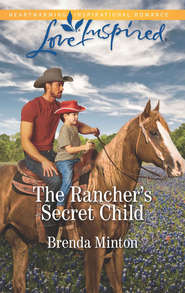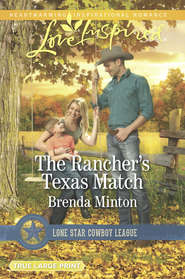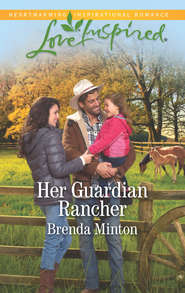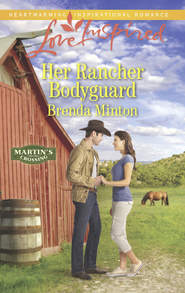По всем вопросам обращайтесь на: info@litportal.ru
(©) 2003-2025.
✖
The Rancher's Christmas Match
Настройки чтения
Размер шрифта
Высота строк
Поля
Kylie moved quietly, scooping tea into a cup and setting a kettle on to boil. “The oil is in the cabinet,” she told him.
Her special blend of oils, made for headaches. It wasn’t a cure-all but it helped when nothing else would. He refused to continue taking prescription pain pills. He’d realized early on that genetics were a thing and he had a fear of turning into Jack. Or the man Jack had been, before conquering his addiction.
He poured a few drops of oil in his palm and applied it to his temples as he waited for the cup of tea to steep.
“How’d you find them?” Kylie asked.
“Find them?”
“The girl and her mother?” Kylie slid the tea across the counter to him.
“I was at the feed store, ordering grain, and she offered me a ride home.” He shrugged, as if it hadn’t been a big deal.
Kylie’s eyes widened. “A woman with a little girl gave a random stranger a ride?” She leaned on the counter.
“Something like that,” he offered.
“You’re not that charming,” she said.
“No, I’m not. She thought I’d been drinking and didn’t want me driving.”
Kylie chuckled. “That sounds more like it. And you were only too willing to take her up on the offer, huh?”
Isaac grabbed his cup, tipped his hat at his well-meaning sister-in-law and decided it was time to find a dark corner.
“I never took you for a coward,” she called out to his retreating back.
“I never said otherwise,” he called back to her without turning.
He pulled his sunglasses out of his pocket. With the shades in place, he headed out the back door and in the direction of the old farmhouse that Jack had remodeled for the men who called Mercy Ranch home.
The cool November air revived him a bit as he crossed the wide expanse of lawn in the direction of the two-story house that had been Jack’s when Isaac first came to live here. Or more accurately, when his mother had dumped him here at the ranch. She’d told Jack that his son was getting difficult and she’d done her time as parent.
Done her time. As if parenting had been a prison for her.
In a way, he guessed it had. She’d had to occasionally think of someone other than herself. Which meant she’d kept a supply of soup in the cabinets and he’d fended for himself while she’d been off partying with friends.
In the beginning, life with Jack hadn’t been much better. Isaac had been a rebellious preteen. Jack had been a raging, heavy on the rage, alcoholic.
Isaac sipped his tea as he walked, inhaling the bitter brew that tasted as bad as it smelled. As long as it helped the headache, he didn’t mind.
Ted, the Australian shepherd he’d brought home more than a dozen years ago, met him as he approached the house. The dog had slowed down a bit. Old age and a bad run-in with a car on the road had left the dog as gimpy as some of the men who lived at Mercy Ranch. But Ted was loyal and just about the best company Isaac knew of. As he climbed the back porch steps, he settled his hand on the dog’s dark gray head.
“They’re right about dogs being man’s best friend, Ted. Don’t let anyone tell you otherwise.” He’d gotten the dog during his rougher-than-a-dirt-road teen years. The animal had been waiting for him when he returned from Afghanistan, wounded and angry.
“I guess that means I’m not your best friend?” Joe Lawson, another resident of the ranch, called out from the kitchen.
“You’re a friend,” Isaac responded. “But you’re kind of worthless at arm wrestling and not much of a right-hand man.”
“I never get tired of that joke,” Joe grumbled, doing a decent job of fixing a pot of coffee with his left hand. He’d lost his right arm when an IED exploded in Kabul.
“I never get tired of saying it,” Isaac responded. It was the same joke and the same comeback every day. Routine. They lived for routine.
They all had their stories. They didn’t share much of their past or even much about what had brought them to Mercy Ranch. People called them wounded warriors but they were survivors.
“Going to bed?” Joe called out as Isaac headed for the stairs.
“Yeah.”
“Bad?” the other man asked.
“Not the worst, but I’d like to head it off at the pass.”
Joe came out from behind the counter, wiping his hand on the apron that hung from his neck. Joe found therapy in cooking.
“Eve said a woman brought you home. Her little girl had a seizure.”
If there’d been a list of things, that subject would have come under the heading Last Thing in the World Isaac Wants to Discuss.But Joe knew that. And Joe didn’t care.
“I’m going to my room. Make sure no one knocks on my door.”
“Gotcha.”
He pretended he didn’t hear Joe’s laughter following him up the stairs.
* * *
“She’s fine,” Dr. Carson West assured Rebecca as he sat back in the chair he’d pulled close to the sofa.
He winked at her daughter, who had his stethoscope in her ears, listening to her own heartbeat.
Of course Allie was fine. Rebecca drew in a deep breath at his reassurance. No matter how often this happened and how many times she heard that everything would be okay, it didn’t get any easier. As a mother, she wanted to fix everything for her child. She wanted to take away the seizures, the fear, all of it.
“Has she always had them?” he asked, turning to face Rebecca.
“Five years.”
“She could outgrow this,” he offered.
“We hope she does. They’ve been happening less frequently.”
“Only twice this year.” Allie sat up a little, pulling the stethoscope from around her neck and holding it out to Carson.
“How does it sound?” he asked.
“Like normal.” Allie leaned back into the pillow and pulled the quilt up around her shoulders. “Where did Isaac go?”
Carson placed the stethoscope in his doctor bag. “He probably went to his room. When he has a headache, he’s kind of a bear to be around.”











